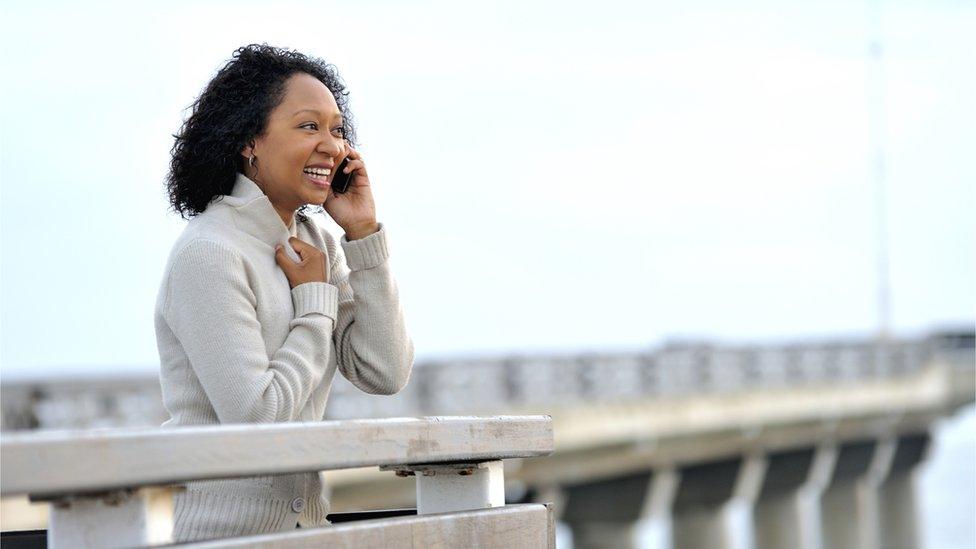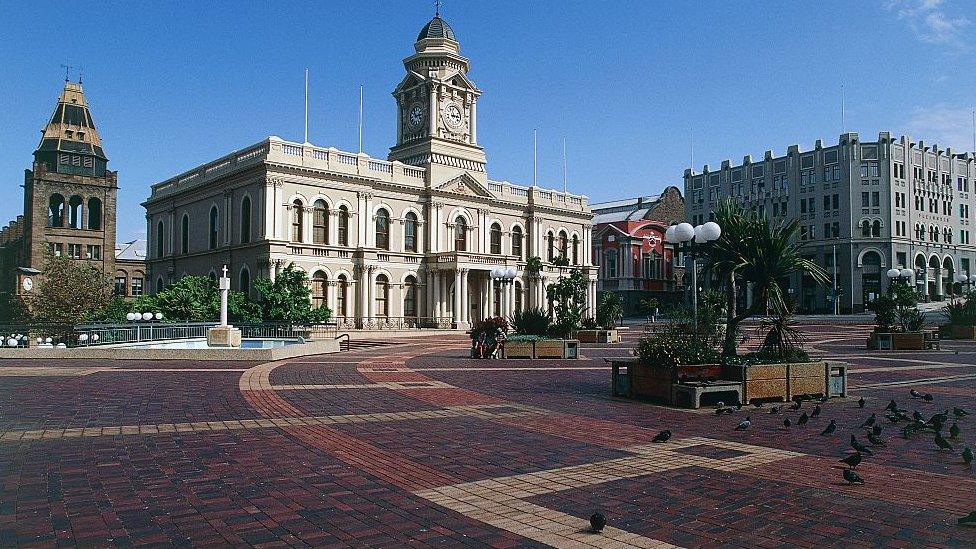South African city of Port Elizabeth becomes Gqeberha
- Published

The city's pier is a popular tourist attraction
Many South Africans are learning how to pronounce Gqeberha, the new name for the city of Port Elizabeth.
It is the Xhosa name for the Baakens River, which flows through the city.
Xhosa is one of South Africa's 11 official languages and one of the few in the world that has a "click" sound, which can be difficult for non-Xhosa speakers to master.
One tweeter, external reflected the views of many: "My Xhosa people. Teach us. How do you pronounce Gqeberha?"
Some have been giving each other a little help. One tweeter broke it down phonetically, saying the "Gqe" was a tongue click, "bear" for "be" and adding a guttural "g" before the ha: "Click bear gha."
Allow X content?
This article contains content provided by X. We ask for your permission before anything is loaded, as they may be using cookies and other technologies. You may want to read X’s cookie policy, external and privacy policy, external before accepting. To view this content choose ‘accept and continue’.

Gqeberha is one of a number of name changes to cities, towns and airports in the Eastern Cape province announced by Arts and Culture Minister Nathi Mthethwa.
The BBC's Pumza Fihlani on how to master the Xhosa tongue-twisters
The city's airport is now named after David Stuurman, a leader of the Khoi people who fought colonialists in the 19th Century.
He was among the first political prisoners to be jailed on Robben Island off Cape Town - from which he once escaped. He died in Australia where he had been transported to serve a life sentence.

Why choose a 'tongue-twister'?
By BBC's Pumza Fihlani, Johannesburg
The name changes have got people talking - and while some have taken to social media to either ask for help on how to pronounce them, others are simply confused if not even a little irritated about why the names were changed in the first place.
Xhosa's tongue-twister sounds do not come naturally to non-Xhosa speakers - even many black South Africans. So it's likely that many will still use the names they know.
So why the change? Officials believe changing some of the country's many colonial- or apartheid-legacy names will help bring dignity to the black communities living there.
It is part of a call made by the arts and culture minister last year for an audit of offensive names. It is seen as a way of writing black people into history.

Not everyone is happy about the new names and the matter has been dragging on for several years, with residents submitting objections.
A petition to keep the name Port Elizabeth, often shortened to PE, started more than a year ago has more than 32,000 signatures - garnering several thousand on Wednesday following the official change.

Gqeberha was commonly known as PE and is the financial hub of the Eastern Cape
Port Elizabeth was founded in 1820 by British settlers and named in memory of the late wife of the Cape Colony's then governor.
Some see the name changes as a waste of money at a time when the economy is struggling.
Michael Cardo, an opposition Democratic Alliance MP, said that the Eastern Cape had the highest unemployment rate in country, according to official statistics.
"But, hey, its towns and airports have a new bunch of names. #Progress," he tweeted, external.
Others have been posting memes about their pronunciation problems:
Allow X content?
This article contains content provided by X. We ask for your permission before anything is loaded, as they may be using cookies and other technologies. You may want to read X’s cookie policy, external and privacy policy, external before accepting. To view this content choose ‘accept and continue’.

Another tweeter pointed out that South Africans had learnt to get their tongues around Afrikaans names like famous rugby player Joost Heystek van der Westhuizen.
"You will learn to say 'Gqeberha'," Rashid Kay said, external.
White-minority rule ended in South Africa in 1994 with the election of Nelson Mandela, but it has been slower than most African countries in changing place names that reflect earlier colonial rulers.
Some cities have, like the capital, Pretoria, kept their name but the local government areas under which they come have been renamed.
For example, Pretoria is in Tswane Metropolitan Municipality and the city of Durban it in eThekwini Metropolitan Municipality.

South Africa's name changes
Cities:
Was Port Elizabeth - now Gqeberha
Was Uitenhage - now Kariega
Towns:
Was Berlin - now Ntabozuko
Was MaClear Town - now Nqanqarhu
Was King William's Town - now Qonce
Airports:
Was Port Elizabeth International Airport - now Chief Dawid Stuurman International Airport
Was East London Airport - now King Phalo Airport
Related topics
- Published9 July 2024
